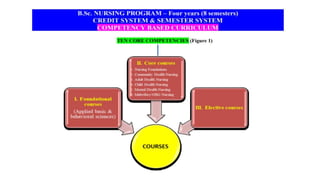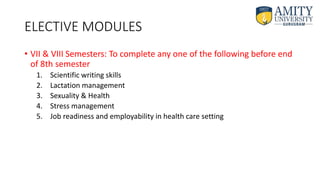Semester system in BSc Nursing
- 1. Overview of New B.Sc. Nursing Curriculum Prof. (Dr.) Smriti Arora Amity College of Nursing Amity University Haryana
- 2. Introduction • INDIAN NURSING COUNCIL • NOTIFICATION • New Delhi, the 5th July, 2021 • [INDIAN NURSING COUNCIL {REVISED REGULATIONS AND CURRICULUM FOR B.SC. (NURSING) PROGRAM), REGULATIONS, 2020]
- 5. Core competencies 1. Patient centered care: Provide holistic care recognizing individual patient‘s preferences, values and needs, that is compassionate, coordinated, age and culturally appropriate safe and effective care. 2. Professionalism: Demonstrate accountability for the delivery of standard-based nursing care as per the Council standards that is consistent with moral, altruistic, legal, ethical, regulatory and humanistic principles. 3. Teaching & Leadership: Influence the behavior of individuals and groups within their environment and facilitate establishment of shared goals through teaching and leadership 4. System-based practice: Demonstrate awareness and responsiveness to the context of healthcare system and ability to manage resources essential to provide optimal quality of care. 5. Health informatics and Technology: Use technology and synthesize information and collaborate to make critical decisions that optimize patient outcomes.
- 6. Core competencies 6. Communication: Interact effectively with patients, families and colleagues fostering mutual respect and shared decision making to enhance patient satisfaction and health outcomes. 7. Teamwork and Collaboration: Function effectively within nursing and interdisciplinary teams, fostering open communication, mutual respect, shared decision making, team learning and development. 8. Safety: Minimize risk of harm to patients and providers through both system effectiveness and individual performance. 9. Quality improvement: Use data to monitor the outcomes of care processes and utilize improvement methods to design and test changes to continuously improve the quality and safety of healthcare system. 10. Evidence based practice: Identify, evaluate and use the best current evidence coupled with clinical expertise and consideration of patient‘s preferences, experience and values to make practical decisions.
- 9. Characteristics • Main focus is mastery of competencies. • Students are provided with opportunities to learn a whole range of skills in addition to acquiring knowledge related to nursing practice (nursing and midwifery). • This is achieved through learning in skill lab/simulated lab and clinical environment. • Simulation will be integrated throughout the curriculum wherever feasible to enable them to develop competencies before entry into real field of practice.
- 10. Characteristics • The revised curriculum embraces competency-based and outcome-based approach throughout the program integrating mastery learning and self- directed learning. • Blended learning approach comprising of experiential learning, reflective learning, scenario based learning and simulated learning is also inbuilt
- 13. ELECTIVE MODULES The choice-based system is applicable to electives only and is offered in the form of modules Number of electives to be completed: 3 (Every module = 1 credit = 20 hours) • III & IV Semesters: To complete any one elective by end of 4th semester across 1st to 4th semesters 1. Human values 2. Diabetes care 3. Soft skills
- 14. Elective modules • V & VI Semesters: To complete any one of the following before end of 6th semester 1. CBT 2. Personality development 3. Addiction psychiatry 4. Adolescent health 5. Sports health 6. Accreditation and practice standards 7. Developmental psychology 8. Menopausal health 9. Health Economics
- 15. ELECTIVE MODULES • VII & VIII Semesters: To complete any one of the following before end of 8th semester 1. Scientific writing skills 2. Lactation management 3. Sexuality & Health 4. Stress management 5. Job readiness and employability in health care setting
- 17. Theory- 1: 20 Lab- 1:40 Clinicals- 1:80
- 24. New things • Competency based • CBCS • Adding new subjects- health informatics, forensic science, professional ethics • Mandatory modules • Continuous assessment • Examination- MCQs, OSCE • Lab/simulation • Log book
- 25. Advantages • In semester system, examinations become a part and parcel of the daily routine and the system no more produces any sort of stress and strain among the students. • The external examinations become more valid and reliable measure of performance due to continuous internal evaluation being carried out as an integral part of the system. • Each semester has a specified number of working days which helps in better budgeting of available time and resources.
- 26. Summary • This system does not allow any kind of slackness on the part of teachers and students; as there is no extra time to waste. • This introduces seriousness and study-culture in the universities • Tough for teachers- Exam every 6 months, Make question papers, evaluation
- 28. Thank you


![Introduction
• INDIAN NURSING COUNCIL
• NOTIFICATION
• New Delhi, the 5th July, 2021
• [INDIAN NURSING COUNCIL {REVISED REGULATIONS AND
CURRICULUM FOR B.SC. (NURSING) PROGRAM), REGULATIONS, 2020]](https://image.slidesharecdn.com/semestersystem-210818180716/85/Semester-system-in-BSc-Nursing-2-320.jpg)

























